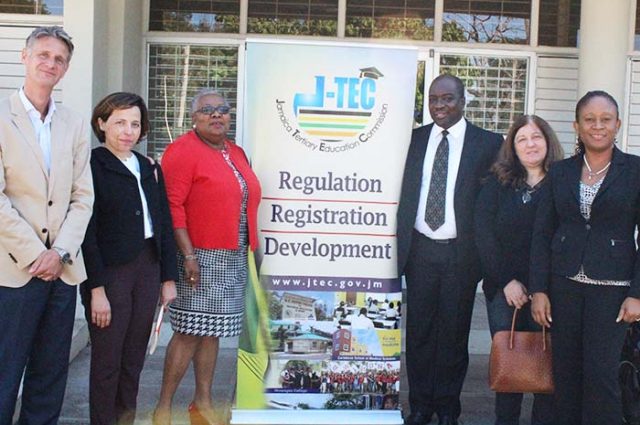JIS: A delegation from the United Nations Educational, Scientific and Cultural Organization (UNESCO) headquarters in Paris was in Jamaica recently to provide technical assistance to the Jamaica Tertiary Education Commission (J-TEC) in framing a strategic plan for the sector.
The delegation comprised Head of the Higher Education Section, Peter Wells; Programme Specialist in charge of Higher Education, Hassmik Tortian; and Programme Specialist in charge of Technical Vocational Education and Training (TVET) and Higher Education Articulation, Katerina Ananiadou. Speaking with JIS News, Institutional Monitoring Officer at J-TEC, Novlet Plunkett, said that the visit, which was an initial scoping mission, was for the purpose of collecting data to inform the strategy.
“It is important that the tertiary sector responds to the changing nature of tertiary education. Changes, which include demographics, modalities for programme delivery and the various demands being made on the sector necessitate the development of a strategy,” she said.
During the six-day working visit, the team met with several key stakeholders including senior representatives from the Ministry of Education, Youth and Information; the Ministry of Labour and Social Security; tertiary institutions such as the University of the West Indies (UWI); University of Technology (UTech); The Mico University College; and Caribbean Maritime Institute (CMI); the Council of Community Colleges; Teachers Colleges of Jamaica; Joint Board of Teacher Education; the Jamaica Association of Private Tertiary Institutions; Jamaica Teachers’ Association (JTA); West Indies Group of University Teachers (WIGUT); and Jamaica Union of Tertiary Students.
The team also met with representatives of the Planning Institute of Jamaica (PIOJ), Inter-American Development Bank (IDB), Human Resource Management Association of Jamaica, and JAMPRO.
Mrs. Plunkett noted that tertiary education is a major contributor to national growth, so it was very important that the team interfaced with representatives of these organisations.
“Some of the outcomes we expect from this initiative are policy directives, which will be used to guide the development of the sector, an enhanced understanding of the role of all of the key players, clarity on the nature of tertiary institutions required to meet national demands and also clarity on the role of private versus public institutions,” she said
Mrs. Plunkett indicated that a report will be compiled and the details of this report will be made available to all stakeholders.
“We will be engaging the institutions and organisations that participated in the meetings to examine the report and to provide feedback,” she said.
J-TEC was established through the Education System Transformation Programme (ESTP) of the Ministry as the regulatory body for tertiary education in Jamaica.
Its primary mandate is to regulate, standardise, safeguard and transform Jamaica’s tertiary education sector.
J-TEC has a responsibility to maintain quality and ensure that the sector meets world-class standards, particularly through regulation, registration and development.
CAPTION: Commissioner of the Jamaica Tertiary Education Commission (J-TEC), Maxine Henry-Wilson (3rdleft); Institutional Monitoring Officer at J-TEC, Novlet Plunkett (right); and Programme Specialist for Education, UNESCO Jamaica, Claude Akpabie (3rd right), share a photo opportunity with members of the team from the UNESCO headquarters in Paris. From left are: Head of the Higher Education Section, Peter Wells; Programme Specialist in charge of TVET and Higher Education Articulation, Katerina Ananiadou; and Programme Specialist in charge of Higher Education, Hassmik Tortian.


